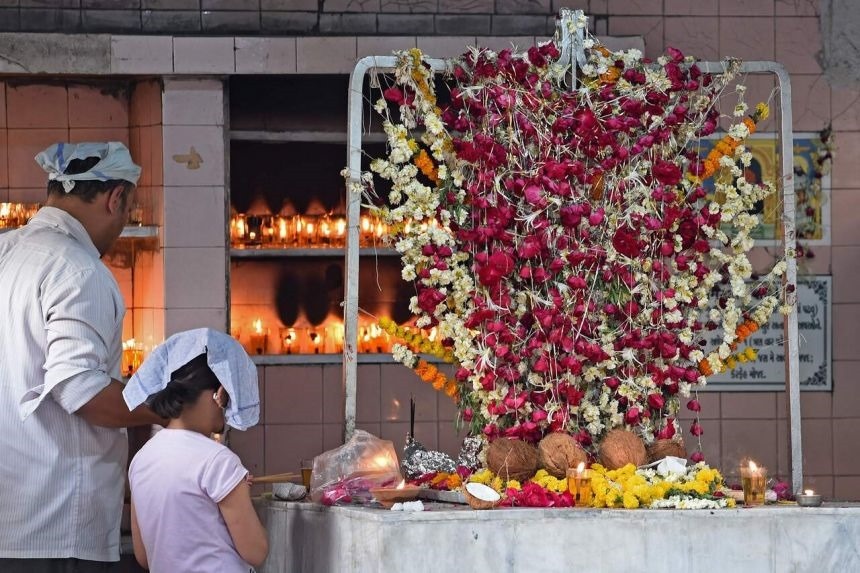They have, for centuries, left their dead to be devoured by scavenging birds and decay naturally atop circular raised structures known as dakhma or Tower of Silence.
But the pandemic has put a stop to this funeral rite for many Parsis, who now have to cremate Covid-19 victims.
Article by Debarshi Dasgupta | The Straits Times
The Parsis, a tiny Indian minority of less than 60,000, follow Zoroastrianism, one of the world’s oldest monotheistic religions, which prescribes veneration for natural elements such as fire and the earth. Cremation or burial defile these elements as dead bodies are considered impure.
However, the Zoroastrian sky burial practice has been proscribed by authorities in the case of Covid-19 victims to prevent any possible spread of infection.
This has brought anguish to many in the community who consider cremations as well as burials as heresy.
It is also believed prayers offered at traditional Zoroastrian funerals guarantee safe passage for a soul across the mythical Chinvat Bridge, or the “bridge of judgment”, that connects the world of the living and the afterlife of the dead.
The thought that his father may not have had such a safe passage tormented a Parsi man living in the state of Gujarat who was identified as Dr Mahiyar Patel in media reports. His father had to be cremated in April after dying of Covid-19. Aggrieved, Dr Patel allegedly created a “bogus High Court order” directing the Surat Parsi Panchayat Board (SPPB) to allow Zoroastrian funeral rites for Covid-19 victims.
He was arrested after the board, which manages affairs of the local Parsi community, complained to the police.
Nonetheless, the board filed a petition last month in the High Court of Gujarat seeking permission for the community to conduct funerals of Covid-19 victims according to Zoroastrian rites.
Not allowing Parsis to do so has “subjected them to immense emotional trauma”, the SPPB’s petition argues.
Mr Jamshed Dotivala, president of the SPPB, said at least 28 Parsis in the city of Surat have died because of Covid-19.
“Christians and Muslims have been given the privilege of burial. The Parsi community should also therefore be given permission to conduct dokhmenashini (Zoroastrian sky burial),” he told The Straits Times.
The total number of Covid-19 deaths among Parsis across India is reported to be around 180.
The court has sought a response from the authorities.
If dokhmenashini is permitted, the trust will decide on any extra precaution needed to conduct its traditional funeral rites, Mr Dotivala said.
The World Health Organisation has stated there is no evidence of any person becoming infected from exposure to bodies of people who died from Covid-19.
Parsis are descendants of Zoroastrians who came to India from present-day Iran. They first arrived seeking refuge from Arab Muslim persecution in Persia around the 8th century. They are a dwindling minority but nonetheless influential, with noted industrialists such as Ratan Tata and Adar Poonawalla, the CEO of Serum Institute of India that manufactures the AstraZeneca Covid-19 vaccine.
Cremating their dead has, however, gained support among some Parsis in recent years. This has been driven, in part, by concerns around a precipitous fall in the population of vultures since the 1990s, which would feed on bodies.
Captive vulture breeding programmes were attempted in Mumbai, which is where a majority of the Parsis are based, but these plans never took off.
The Bombay Parsi Punchayet (BPP) has since installed solar reflectors at the towers to concentrate the sun’s rays on bodies to hasten decomposition but this is ineffective during the monsoon season.
Mr Jehangir Patel, editor and publisher of Parsiana, a semi-monthly magazine published in Mumbai, told The Straits Times that before the pandemic, around 15 per cent of Parsi families preferred to cremate their dead.
“It hasn’t gone up very much beyond that. Basically people still prefer the old system,” he said.
Parsis living in cities without any dakhma, such as in Delhi, have adopted burials.
While Mr Patel said the demand for sky burial of Parsi Covid-19 victims could be seen as legitimate, he added that it is difficult to say whether it is practical or in public interest.
“Some say a corpse does not transmit infection but then you have pallbearers carrying the body, you have got priests standing nearby and you have got relatives sitting in the closed room when prayers are recited,” he said.
“So there is an element of risk which is high and I am not sure if a court of law will take that risk.”
Deciding on an appropriate funeral for Covid-19 victims has further deepened the chasm between conservatives and reformists within the Parsi community, which is noted for its fierce adherence to its faith even to the point of eccentricity.
Certain families in Mumbai who had to cremate Covid-19 victims attempted to have funeral prayers recited near the dakhma as a compromise.
Mr Noshir H. Dadrawala, one of the seven BPP trustees, put forth such a proposal in June last year. It was backed by a Parsi high priest and was made after Mr Dadrawala was approached by a family that had lost a member to Covid-19 and had cremated the body.
However, this was shot down by other trustees of the BPP and priests, who felt it could lead to further dilution of traditional Parsi funeral rites in a post-pandemic world
“There is no reason or logic to this opposition. It is mindless dogma and blind adherence to faith,” Mr Dadrawala told ST.
He argued that such prayers were read in ancient times for those killed during war or overseas travel and whose bodies were not recovered.
“End of the day, these are Zoroastrian prayers recited by Zoroastrian priests and are more for the solace of the living than the dead.”

